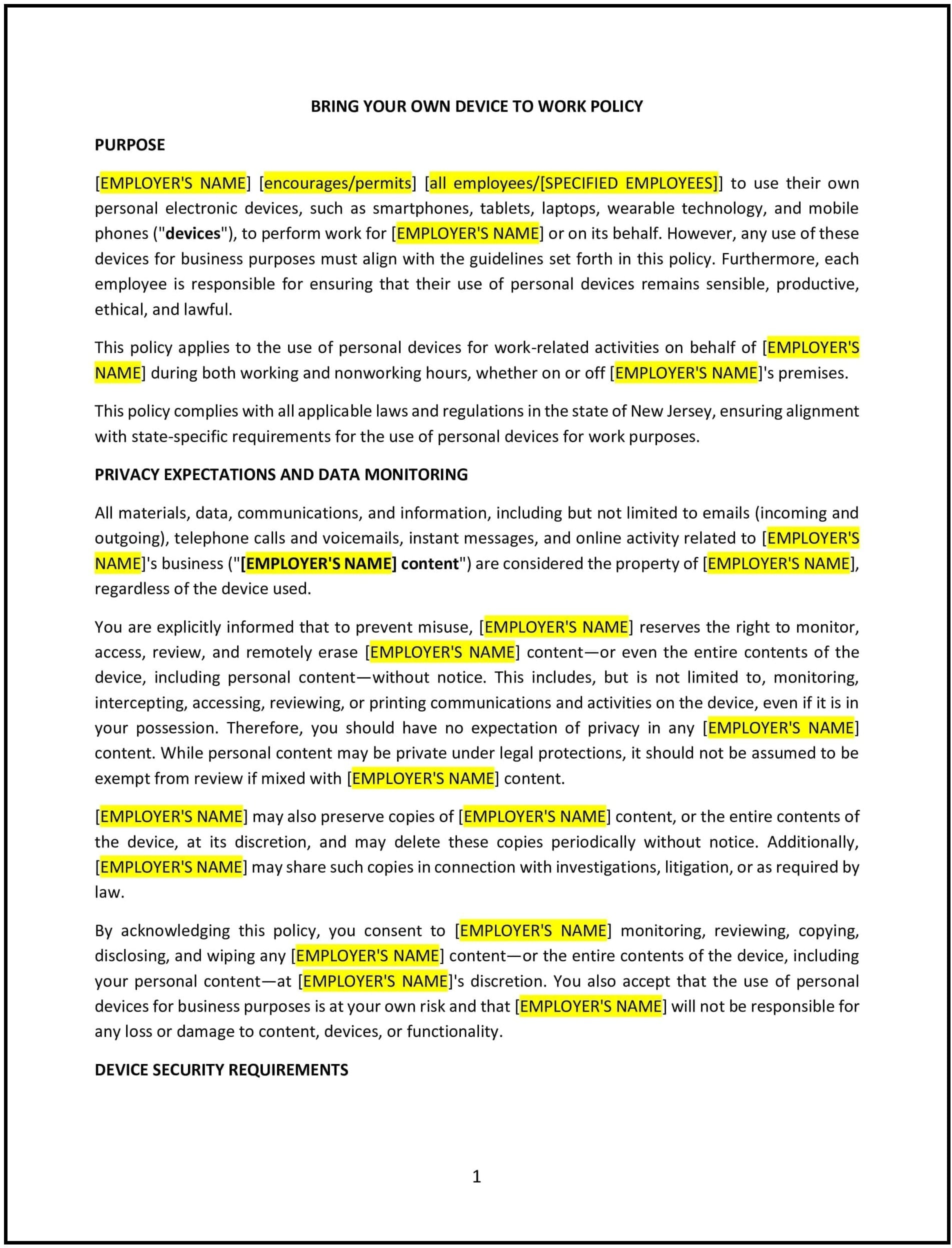Bring your own device to work (New Jersey) policy: Free template
Got contracts to review? While you're here for policies, let Cobrief make contract review effortless—start your free review now.

Customize this template for free
Bring your own device to work (New Jersey)
A bring your own device (BYOD) policy helps New Jersey businesses manage the use of personal devices, such as smartphones, tablets, and laptops, for work-related activities. This policy outlines security requirements, acceptable use, data protection measures, and employee responsibilities when accessing company resources on personal devices. It provides clear guidelines to balance workplace flexibility with business security needs.
By adopting this policy, businesses in New Jersey can enhance efficiency while reducing risks associated with personal device usage in the workplace.
How to use this bring your own device to work policy (New Jersey)
- Define eligible devices: Specify which personal devices employees may use for work purposes, such as smartphones, laptops, and tablets, and outline any minimum security requirements.
- Establish security and access requirements: Require employees to use password protection, encryption, and security updates to prevent unauthorized access to company data.
- Set acceptable use guidelines: Explain which business functions employees may perform on personal devices, such as accessing company emails, documents, or communication platforms.
- Outline data protection measures: Specify how company data should be stored, accessed, and transmitted on personal devices to minimize security risks.
- Implement remote access controls: Require employees to connect to company networks through secure VPNs or designated access points to protect sensitive information.
- Address company monitoring and privacy: Clarify that while businesses may enforce security measures, they should respect employees' personal privacy and limit monitoring to work-related activities.
- Detail responsibilities for lost or stolen devices: Provide guidelines for reporting lost or stolen devices and outline the process for remotely wiping company data if necessary.
- Explain exit procedures: Require employees to remove company-related applications and data from personal devices upon termination or resignation.
- Review and update: Regularly assess the policy to reflect changes in technology, cybersecurity threats, and New Jersey regulations.
Benefits of using this bring your own device to work policy (New Jersey)
This policy provides several benefits for New Jersey businesses:
- Enhances workplace flexibility: Allows employees to work from personal devices while maintaining security and productivity.
- Reduces hardware costs: Minimizes the need for businesses to provide company-owned devices, lowering operational expenses.
- Protects company data: Establishes security requirements to reduce the risk of data breaches and unauthorized access.
- Increases employee convenience: Enables employees to work with familiar devices, improving efficiency and workflow.
- Promotes clear expectations: Provides employees with clear guidelines on the appropriate use of personal devices for work purposes.
Tips for using this bring your own device to work policy (New Jersey)
- Communicate the policy clearly: Ensure employees understand the BYOD policy, security requirements, and acceptable use guidelines.
- Enforce security measures: Require employees to follow security protocols such as password protection, multi-factor authentication, and remote wipe capabilities.
- Limit access to sensitive data: Restrict the type of company data employees can store or access on personal devices.
- Provide IT support: Offer guidance on configuring devices for secure access to company resources.
- Review the policy regularly: Adjust the policy as needed to address evolving cybersecurity threats and changes in business operations.